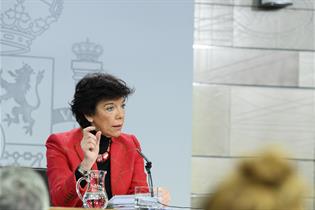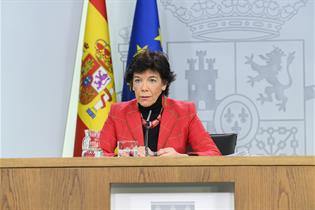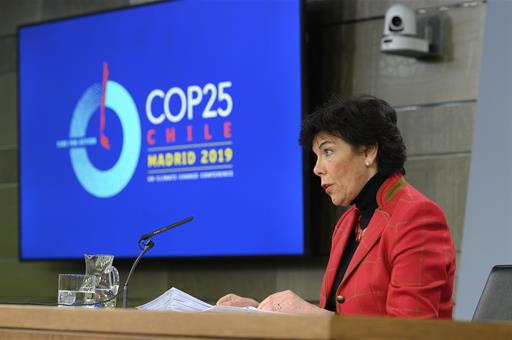Council of Ministers
Government steps up controls to prevent sale of counterfeit medication
Council of Ministers - 2019.12.5
Moncloa Palace, Madrid
The Council of Ministers modified the procedure for the authorisation, registration and the conditions for dispensing medication for human use from industrial manufacturing, with the aim of adapting Spanish regulations to European regulations in terms of their verification and authentication.
The Acting Minister for Education and Vocational Training, and Government Spokesperson, Isabel Celaá, explained that control will be enhanced through digitalisation mechanisms to prevent the entry of counterfeit medication on the market.
Laboratories will be obliged to maintain the state of commercialisation of their medicines updated and to notify their withdrawal from the market with six months' notice. Furthermore, homeopathic products with therapeutic indications will be assessed with the same criteria as any other medication and will have to present the appropriate clinical trials.
Isabel Celaá underlined that each medicine will have a unique identifier and a safety feature to prevent manipulation.
The establishment of the SNSFarma Node will also be regulated - an instrument for technological integration and the sharing of information with the national repository, in other words, with the national digital platform that contains information on the unique identifiers of medication sold in Spain.
Strategic Action in Healthcare subsidies
 Pool Moncloa/Borja Puig de la BellacasaThe government authorised, one month earlier than established, the Carlos III Health Institute to publish the 2020 round of proposals for the granting of subsidies for Strategic Action in Healthcare for more than 100 million euros.
Pool Moncloa/Borja Puig de la BellacasaThe government authorised, one month earlier than established, the Carlos III Health Institute to publish the 2020 round of proposals for the granting of subsidies for Strategic Action in Healthcare for more than 100 million euros.
This action contributes to fostering the health and well-being of citizens, as well as developing the preventive, diagnostic, rehabilitation and palliative aspects of disease. It constitutes the main tool for the financing of biomedical and healthcare research in Spain.
Isabel Celaá reported that this round of proposals will allow different contracts to be signed with trainee doctors, doctors and researchers at public healthcare institutes. A new feature of this programme is that it introduces improvements to develop gender equality, promote young scientists and guarantee continuity in lines of research.
Contracts with public authorities
The government has extended the deadlines for companies that are contracted by public authorities to adapt to the new system for the classification of contractors regulated on 28 August.
The Acting Government Spokesperson stated that companies will be classified according to the value of the works or services. For those contracts worth more than 5 million euros, in the case of works, and 1.2 million in the case of services, the deadline will be extended to one year (until 1 January 2021), while for contracts worth less than these figures, the deadline will be two years (until 31 December 2021).
Other agreements
- The Council of Ministers approved the subscription of an addendum to the agreement signed between the Central Government and the Regional Government of Catalonia and the Technical University of Barcelona for the creation, construction, fitting out, collaboration and operation of the Barcelona Supercomputing Center - Centro Nacional de Supercomputación (BSC-CNS).
- The government presented a report on the functioning of the services of the Peripheral State Administration, where 60.78% of the staff of the General State Administration provide their services.
- The government agreed on an institutional declaration on the occasion of International Human Rights Day held on 10 December. This expresses Spain's commitment to the promotion and protection of these rights, thus contributing to a freer, fairer and more peaceful world.
Governing is a State responsibility
In her customary summary of current affairs, the Acting Government Spokesperson highlighted that by constituting Parliament on Wednesday, the 14th Legislature thus commences, "a compulsory and fundamental step for resolving the political stalemate Spain is mired in". Isabel Celaá underlined that two women - Meritxell Batet and Pilar Llop - are the respective Speakers of the Lower and Upper Houses of Parliament.
Isabel Celaá claimed that the Acting President of the Government, Pedro Sánchez, would be honoured to receive the King's commission to try and guarantee the investiture as the head of the leading political force in the country. "Governing is both a matter and a necessity of State. At this time, helping the governability of the country is a shared responsibility", she added.
Spain's commitment to international stability
 Pool Moncloa/Borja Puig de la BellacasaIn regard to the NATO Summit held on 3 and 4 December in London, attended by the Acting President of the Government, the Acting Government Spokesperson argued that NATO is "a forum for cohesion and consensus that has provided its members with peace and security for many decades". In this regard, he recalled that 30 years have now passed since Spain began overseas missions, which are and will continue to be the finest example of Spain's commitment to international stability.
Pool Moncloa/Borja Puig de la BellacasaIn regard to the NATO Summit held on 3 and 4 December in London, attended by the Acting President of the Government, the Acting Government Spokesperson argued that NATO is "a forum for cohesion and consensus that has provided its members with peace and security for many decades". In this regard, he recalled that 30 years have now passed since Spain began overseas missions, which are and will continue to be the finest example of Spain's commitment to international stability.
On this point, he mentioned that almost 60 people died on Thursday after a vessel heading to the Canary Islands out of Mauritania sank. According to the Acting Government Spokesperson, NATO's first commitment is to guarantee the well-being of people and the stability of their countries to "diminish the drama" of migration.
Joint effort at Climate Conference
Isabel Celaá stressed that the government is heavily committed to and involved in the Climate Conference, together with the UN and Chile, as is the Regional Government of Madrid, the City Council of Madrid and Spanish society as a whole.
The Acting Government Spokesperson stressed the "institutional commitment and coordination of the public authorities and powers with the aim of contributing to a much more sustainable and inhabitable world".
Europe, argued Isabel Celaá, must ensure that large industrialised countries are more committed to the fight against climate change and Spain, as the gateway to the Atlantic, "can and must be a catalyst to mobilise the great Ibero-American Community of Nations".
Non official translation





